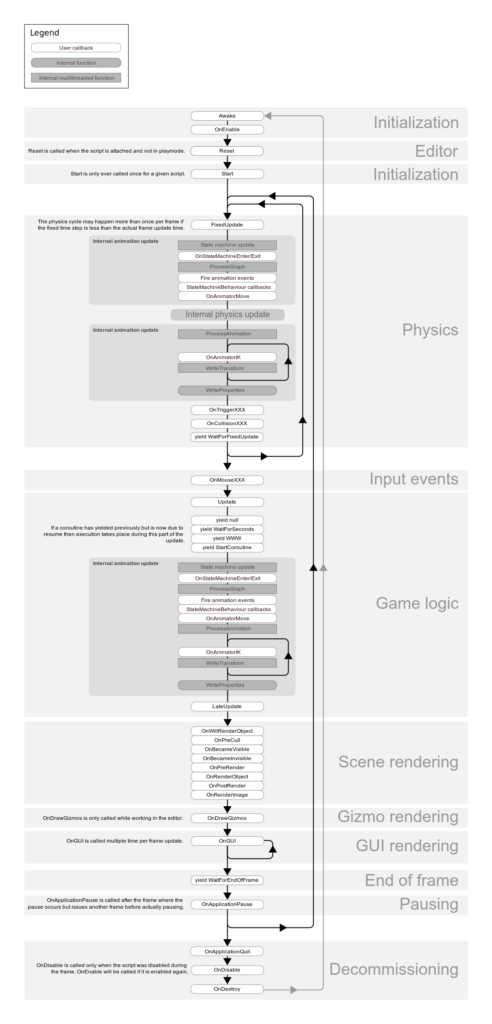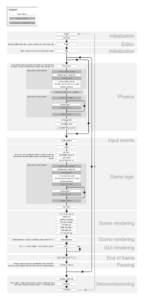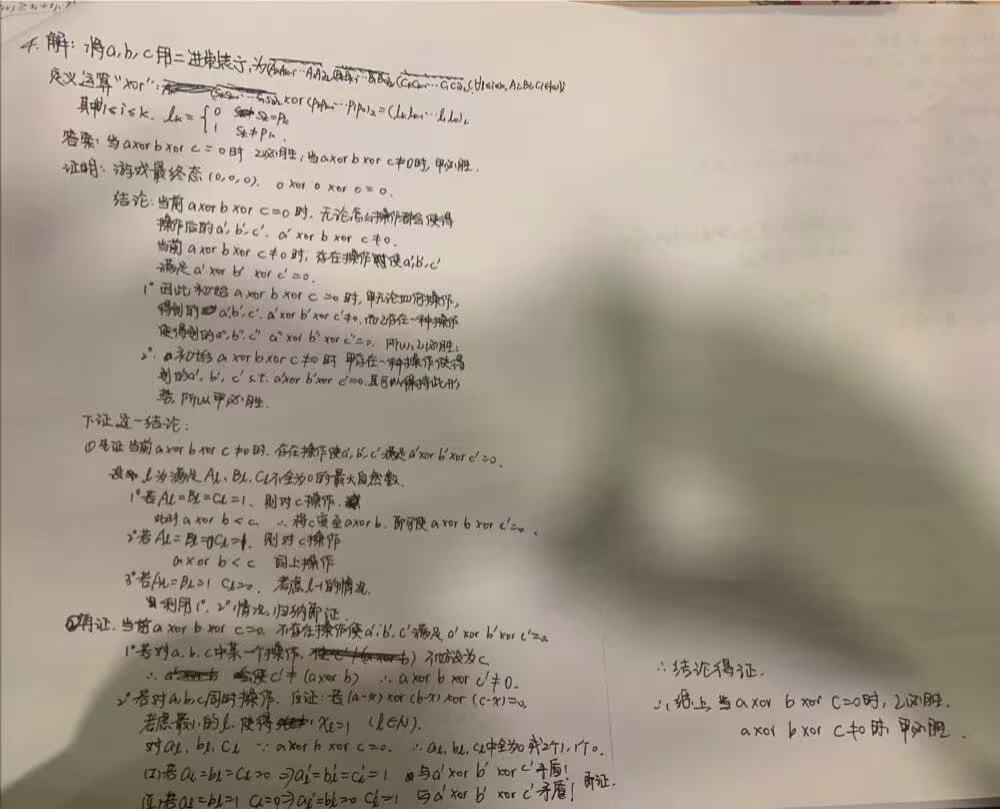下图是Unity的生命周期流程图。

常用事件循环的顺序大概是FixedUpdate->Update->LateUpdate。某些特殊场景(主要是数据同步)下需要在尽量不修改项目原有代码同时添加功能,这时可以对事件循环进行修改(魔改)。
例如:来自Mirror的NetworkLoop的部分代码。
// our ideal update looks like this:
// transport.process_incoming()
// update_world()
// transport.process_outgoing()
//
// this way we avoid unnecessary latency for low-ish server tick rates.
// for example, if we were to use this tick:
// transport.process_incoming/outgoing()
// update_world()
//
// then anything sent in update_world wouldn't be actually sent out by the
// transport until the next frame. if server runs at 60Hz, then this can add
// 16ms latency for every single packet.
//
// => instead we process incoming, update world, process_outgoing in the same
// frame. it's more clear (no race conditions) and lower latency.
// => we need to add custom Update functions to the Unity engine:
// NetworkEarlyUpdate before Update()/FixedUpdate()
// NetworkLateUpdate after LateUpdate()
// this way the user can update the world in Update/FixedUpdate/LateUpdate
// and networking still runs before/after those functions no matter what!
// => see also: https://docs.unity3d.com/Manual/ExecutionOrder.html
// => update order:
// * we add to the end of EarlyUpdate so it runs after any Unity initializations
// * we add to the end of PreLateUpdate so it runs after LateUpdate(). adding
// to the beginning of PostLateUpdate doesn't actually work.
using System;
using UnityEngine;
using UnityEngine.LowLevel;
using UnityEngine.PlayerLoop;
namespace Mirror
{
public static class NetworkLoop
{
// helper enum to add loop to begin/end of subSystemList
internal enum AddMode { Beginning, End }
// callbacks for others to hook into if they need Early/LateUpdate.
public static Action OnEarlyUpdate;
public static Action OnLateUpdate;
// RuntimeInitializeOnLoadMethod -> fast playmode without domain reload
[RuntimeInitializeOnLoadMethod(RuntimeInitializeLoadType.BeforeSceneLoad)]
static void ResetStatics()
{
OnEarlyUpdate = null;
OnLateUpdate = null;
}
// helper function to find an update function's index in a player loop
// type. this is used for testing to guarantee our functions are added
// at the beginning/end properly.
internal static int FindPlayerLoopEntryIndex(PlayerLoopSystem.UpdateFunction function, PlayerLoopSystem playerLoop, Type playerLoopSystemType)
{
// did we find the type? e.g. EarlyUpdate/PreLateUpdate/etc.
if (playerLoop.type == playerLoopSystemType)
return Array.FindIndex(playerLoop.subSystemList, (elem => elem.updateDelegate == function));
// recursively keep looking
if (playerLoop.subSystemList != null)
{
for (int i = 0; i < playerLoop.subSystemList.Length; ++i)
{
int index = FindPlayerLoopEntryIndex(function, playerLoop.subSystemList[i], playerLoopSystemType);
if (index != -1) return index;
}
}
return -1;
}
// MODIFIED AddSystemToPlayerLoopList from Unity.Entities.ScriptBehaviourUpdateOrder (ECS)
//
// => adds an update function to the Unity internal update type.
// => Unity has different update loops:
// https://medium.com/@thebeardphantom/unity-2018-and-playerloop-5c46a12a677
// EarlyUpdate
// FixedUpdate
// PreUpdate
// Update
// PreLateUpdate
// PostLateUpdate
//
// function: the custom update function to add
// IMPORTANT: according to a comment in Unity.Entities.ScriptBehaviourUpdateOrder,
// the UpdateFunction can not be virtual because
// Mono 4.6 has problems invoking virtual methods
// as delegates from native!
// ownerType: the .type to fill in so it's obvious who the new function
// belongs to. seems to be mostly for debugging. pass any.
// addMode: prepend or append to update list
internal static bool AddToPlayerLoop(PlayerLoopSystem.UpdateFunction function, Type ownerType, ref PlayerLoopSystem playerLoop, Type playerLoopSystemType, AddMode addMode)
{
// did we find the type? e.g. EarlyUpdate/PreLateUpdate/etc.
if (playerLoop.type == playerLoopSystemType)
{
// debugging
//Debug.Log($"Found playerLoop of type {playerLoop.type} with {playerLoop.subSystemList.Length} Functions:");
//foreach (PlayerLoopSystem sys in playerLoop.subSystemList)
// Debug.Log($" ->{sys.type}");
// make sure the function wasn't added yet.
// with domain reload disabled, it would otherwise be added twice:
// fixes: https://github.com/MirrorNetworking/Mirror/issues/3392
if (Array.FindIndex(playerLoop.subSystemList, (s => s.updateDelegate == function)) != -1)
{
// loop contains the function, so return true.
return true;
}
// resize & expand subSystemList to fit one more entry
int oldListLength = (playerLoop.subSystemList != null) ? playerLoop.subSystemList.Length : 0;
Array.Resize(ref playerLoop.subSystemList, oldListLength + 1);
// IMPORTANT: always insert a FRESH PlayerLoopSystem!
// We CAN NOT resize and then OVERWRITE an entry's type/loop.
// => PlayerLoopSystem has native IntPtr loop members
// => forgetting to clear those would cause undefined behaviour!
// see also: https://github.com/vis2k/Mirror/pull/2652
PlayerLoopSystem system = new PlayerLoopSystem {
type = ownerType,
updateDelegate = function
};
// prepend our custom loop to the beginning
if (addMode == AddMode.Beginning)
{
// shift to the right, write into first array element
Array.Copy(playerLoop.subSystemList, 0, playerLoop.subSystemList, 1, playerLoop.subSystemList.Length - 1);
playerLoop.subSystemList[0] = system;
}
// append our custom loop to the end
else if (addMode == AddMode.End)
{
// simply write into last array element
playerLoop.subSystemList[oldListLength] = system;
}
// debugging
//Debug.Log($"New playerLoop of type {playerLoop.type} with {playerLoop.subSystemList.Length} Functions:");
//foreach (PlayerLoopSystem sys in playerLoop.subSystemList)
// Debug.Log($" ->{sys.type}");
return true;
}
// recursively keep looking
if (playerLoop.subSystemList != null)
{
for (int i = 0; i < playerLoop.subSystemList.Length; ++i)
{
if (AddToPlayerLoop(function, ownerType, ref playerLoop.subSystemList[i], playerLoopSystemType, addMode))
return true;
}
}
return false;
}
// hook into Unity runtime to actually add our custom functions
[RuntimeInitializeOnLoadMethod(RuntimeInitializeLoadType.BeforeSceneLoad)]
static void RuntimeInitializeOnLoad()
{
//Debug.Log("Mirror: adding Network[Early/Late]Update to Unity...");
// get loop
// 2019 has GetCURRENTPlayerLoop which is safe to use without
// breaking other custom system's custom loops.
// see also: https://github.com/vis2k/Mirror/pull/2627/files
PlayerLoopSystem playerLoop = PlayerLoop.GetCurrentPlayerLoop();
// add NetworkEarlyUpdate to the end of EarlyUpdate so it runs after
// any Unity initializations but before the first Update/FixedUpdate
AddToPlayerLoop(NetworkEarlyUpdate, typeof(NetworkLoop), ref playerLoop, typeof(EarlyUpdate), AddMode.End);
// add NetworkLateUpdate to the end of PreLateUpdate so it runs after
// LateUpdate(). adding to the beginning of PostLateUpdate doesn't
// actually work.
AddToPlayerLoop(NetworkLateUpdate, typeof(NetworkLoop), ref playerLoop, typeof(PreLateUpdate), AddMode.End);
// set the new loop
PlayerLoop.SetPlayerLoop(playerLoop);
}
static void NetworkEarlyUpdate()
{
// loop functions run in edit mode and in play mode.
// however, we only want to call NetworkServer/Client in play mode.
if (!Application.isPlaying) return;
NetworkTime.EarlyUpdate();
//Debug.Log($"NetworkEarlyUpdate {Time.time}");
NetworkServer.NetworkEarlyUpdate();
NetworkClient.NetworkEarlyUpdate();
// invoke event after mirror has done it's early updating.
OnEarlyUpdate?.Invoke();
}
static void NetworkLateUpdate()
{
// loop functions run in edit mode and in play mode.
// however, we only want to call NetworkServer/Client in play mode.
if (!Application.isPlaying) return;
//Debug.Log($"NetworkLateUpdate {Time.time}");
// invoke event before mirror does its final late updating.
OnLateUpdate?.Invoke();
NetworkServer.NetworkLateUpdate();
NetworkClient.NetworkLateUpdate();
}
}
}可以看到,引入了UnityEngine.LowLevel,属于Unity中十分非常特别底层的API,有点C Style,比较麻烦,不太方便在运行时修改。因此建议在游戏开始前就调整好事件循环,并遵循只增不减的原则。
© 版权声明
文章版权归作者所有,未经允许请勿转载。
THE END










暂无评论内容